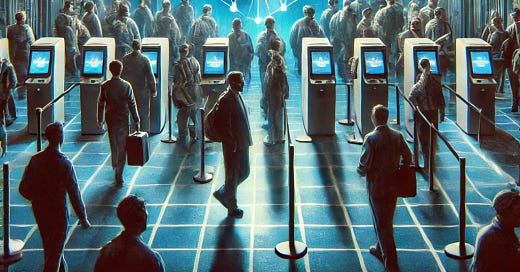As 2025 begins, a trio of legislative changes is reshaping the landscape of freedom and liberty. These new laws, spanning domestic and international travel, digital identity, and financial privacy, collectively tighten the grip of surveillance and bureaucracy on individuals’ lives. While proponents argue these measures enhance security and streamline processes, critics raise alarms about their implications for personal freedoms. Let’s delve into the details of these developments and assess their impact.
Domestic and International Travel Rules
Starting in 2025, new travel requirements are taking effect across the United States, significantly altering how citizens move domestically and abroad. One of the most controversial changes involves stricter ID requirements for air travel. Under the REAL ID Act, passengers must present a federally approved identification card featuring enhanced security measures to board domestic flights. This shift has sparked concerns about federal overreach and potential misuse of data collected during the ID issuance process.
Adding to the controversy is the rollout of facial recognition scanning at TSA checkpoints in U.S. airports. The Transportation Security Administration (TSA) argues that these scanners will speed up security lines and enhance safety by accurately verifying passenger identities. However, privacy advocates warn that facial recognition technology comes with significant risks, including potential misuse for mass surveillance and the erosion of anonymity in public spaces. Questions about the accuracy of these systems—especially for individuals with darker skin tones—and the long-term storage of biometric data further compound these concerns. Many fear that the normalization of such invasive technology could pave the way for broader government monitoring beyond airports.
International travel isn’t spared either. U.S. citizens heading abroad will need to navigate a maze of new biometric and digital passport requirements. The increased reliance on biometric data, including facial recognition and fingerprints, raises questions about how securely this information will be stored and whether it could be used for purposes beyond its stated intent. Privacy advocates worry these measures normalize invasive data collection, setting a precedent for broader surveillance.
The EU Digital Identity Wallet
Across the Atlantic, the European Union is implementing its Digital Identity Wallet (DIW) initiative. This ambitious program aims to provide every EU citizen with a unified digital identity, enabling seamless interaction with government services, banks, healthcare providers, and more. By consolidating various forms of identification into one digital platform, the EU hopes to simplify administrative processes and promote cross-border mobility within the bloc.
However, critics argue that the DIW poses significant risks to personal privacy and autonomy. Centralizing sensitive information in a digital wallet creates a single point of failure, potentially making it a prime target for cyberattacks. Moreover, there are fears that such a system could evolve into a tool for social control, where access to services might be contingent on compliance with government mandates. The potential for abuse is especially concerning in an era where dissent is increasingly met with digital censorship and financial exclusion.
The Travel Rule for Digital Assets
In the realm of finance, the European Union has extended its Travel Rule to digital assets, requiring Virtual Asset Service Providers (VASPs) to collect and share information about transactions exceeding a certain threshold. While the rule’s stated goal is to combat money laundering and terrorism financing, its implementation has drawn criticism from the cryptocurrency community.
The Travel Rule mandates that both the sender and recipient’s information accompany transactions, essentially stripping away the pseudonymity that many digital asset users value. This regulation could stifle innovation in the cryptocurrency sector by imposing compliance costs on smaller businesses and forcing individuals to sacrifice privacy. Additionally, the requirement to store vast amounts of sensitive data increases the risk of breaches, potentially exposing users to identity theft and other cybercrimes.
Conclusion: A Crossroads for Liberty
The legislative changes of 2025 represent a critical juncture in the ongoing struggle between security and freedom. Enhanced travel requirements, digital identity initiatives, and stricter financial regulations might offer convenience and safety in some contexts, but they also pose significant threats to individual liberties.
These laws highlight the creeping normalization of surveillance and centralization, raising the specter of a future where privacy and autonomy are sacrificed at the altar of efficiency and security. As these measures take hold, it’s crucial for citizens, policymakers, and advocacy groups to push back against overreach, demand transparency, and safeguard the fundamental rights that underpin a free society.
The year 2025 is more than just a marker of time; it’s a call to vigilance. As we navigate these new realities, let us remember the words of Benjamin Franklin: “Those who would give up essential Liberty, to purchase a little temporary Safety, deserve neither Liberty nor Safety.”
Not financial or legal advice, for entertainment only, do your own homework. I hope you find this post useful as you chart your personal financial course and Build a Bitcoin Fortress in 2025.
Thanks for following my work. Always remember: freedom, health and positivity!
Please also check out my Bitcoin Fortress Podcast on all your favorite streaming platforms. I do a weekly Top Bitcoin News update every week on Sunday, focused on current items of interest to the Bitcoin community. Please check it out if you haven’t already. Also now on Fountain, where you can earn Bitcoin just for listening to your favorite podcasts.
Follow me on Nostr:
npub122fpu8lwu2eu2zfmrymcfed9tfgeray5quj78jm6zavj78phnqdsu3v4h5
If you’re looking for more great Bitcoin signal, check out friend of the show Pleb Underground here.
Lightning tips appreciated here.




